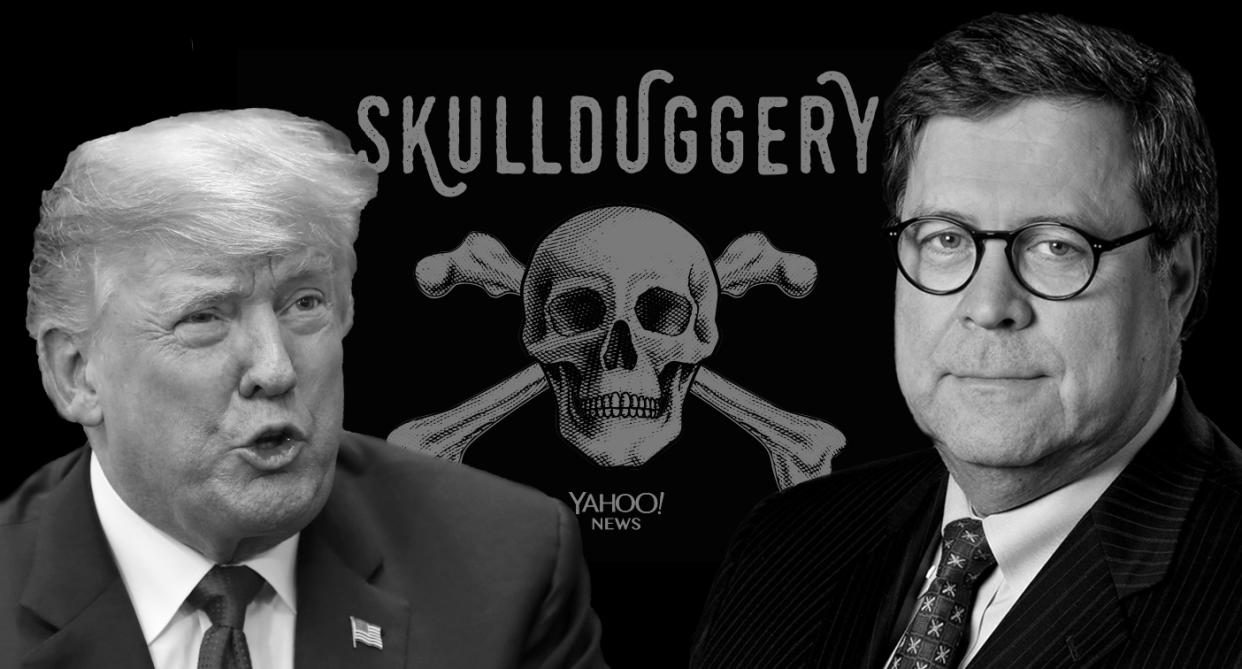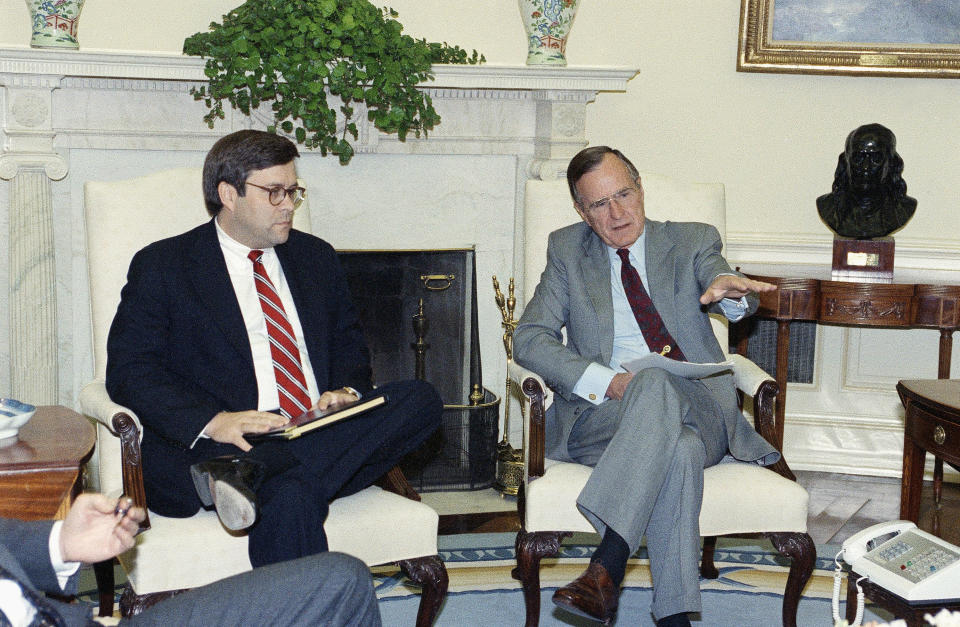Trump first wanted his attorney general pick William Barr for another job: Defense lawyer

In late spring 2017, President Trump was having a hard time finding a topflight lawyer to spearhead his defense in the sprawling Russian investigation conducted by the new special counsel Robert Mueller. Some of the most prominent litigators in Washington had turned aside overtures to represent the president in the case, expressing concerns that he would not listen to their advice anyway.
Around that time, sources tell Yahoo News, White House officials reached out to a man they thought would be an ideal candidate: William P. Barr, the attorney general under President George H.W. Bush. An outspoken conservative, Barr had gotten on Trump’s radar screen that spring after he had written a newspaper op-ed vigorously defending the president’s decision to fire FBI Director James Comey. At one point, Barr was ushered into a brief White House meeting with Trump, who asked him if he was interested in the job, according to a source who was present for the meeting. Barr demurred. He had other obligations, he said. He would have to think about it.
The talk among Trump and his top advisers about hiring Barr as chief defense lawyer did not stop there. It arose again this year after the departure of John Dowd, Trump’s lead lawyer for the special counsel investigation, and continued until the summer, when the president found another candidate far more eager for the job: Rudy Giuliani. But now in a twist few could have anticipated, Trump has tapped Barr for an even more important position: attorney general, a post that, if he is confirmed, would put him in charge of the Mueller investigation.
The decision to nominate Barr has won applause by many of his former colleagues, who praise him as a savvy Washington veteran with expansive, hard-edged views about executive power, but who at the same time is steeped in the culture of the Justice Department and its tradition of fiercely resisting improper influences on pending prosecutions.
But Barr’s nomination has also raised potentially thorny political questions about how independent he would be in overseeing the Russia probe and whether his previously expressed views defending the president — and criticizing some aspects of the Mueller investigation — could potentially compromise his leadership.
Timothy Flanigan, who served under Barr as assistant attorney general in charge of the Office of Legal Counsel, told the Yahoo News “Skullduggery” podcast Saturday that those concerns are misplaced. Barr, he said, was “blunt” and “direct,” and would have no problem standing up to Trump — or brushing back against the kind of tweetstorm attacks that Trump leveled against his last attorney general, Jeff Sessions. “Bill is tough and he’s not likely to be pushed around,” Flanigan said. “If it came to it, and Bill is being attacked — I don’t know that Bill has a Twitter account — but he just might get one.”
Still, Flanigan and others who worked with Barr at the Justice Department expressed surprise that he would even agree to take the job. White House officials “have been talking to him on and off for a long time. It started with the Russia defense job and then it was for the AG’s job as well,” said one source familiar with the conversations. “They talked to him multiple times. They were trying to convince him.”
Notably, the source said, Barr had watched with dismay Trump’s attacks on Sessions and had no interest in putting up with the same sort of abuse. What finally changed his mind? “Patriotism,” said Flanigan. He and others say Barr genuinely felt the call of duty, especially after the turmoil the Justice Department has experienced in recent weeks with the selection as acting attorney general of Matthew Whitaker, an obscure and inexperienced former U.S. attorney from Iowa whose main apparent credential was that he had previously defended Trump on cable TV.

Barr has deep, ongoing and personal ties to the Justice Department. His daughter, Mary Daly, a former federal prosecutor in New York, was named director of opioid enforcement earlier this year in a newly created position under Deputy Attorney General Rod Rosenstein. After Barr’s name was floated as a likely attorney general pick this week, several department veterans reached out to him, pleading with him to take the job, saying they were “lighting candles” hoping the reports of his nomination were true, said one knowledgeable source.
But before he returns to the Justice Department, Barr will have to undergo a confirmation process where he will be questioned by Senate Democrats about his past discussions with Trump and others at the White House — as well as his public comments that touch on key aspects of the Mueller probe.
One starting point is likely to be Barr’s May 12, 2017, Washington Post op-ed that ran three days after the firing of Comey that run under the headline: “Trump Made the Right Call on Comey.” At the time, Trump was facing a storm of controversy over the Comey firing, especially after he acknowledged that “this Russia thing” was a factor in his decision — a motivation that has since blossomed into a central issue in the portion of Mueller’s investigation focused on potential obstruction of justice.
But Barr argued in his op-ed that Trump was well within his rights to fire Comey and had legitimate grounds for doing so, given that the FBI director bypassed the Justice Department when he publicly announced his recommendation during the 2016 election not to prosecute Hillary Clinton over her private email server. Arguing that the FBI director was never “in charge” of the Russia investigation anyway — that was a responsibility that Justice officials had — Barr contended: “Comey’s removal simply has no relevance to the integrity of the Russian investigation as it moves ahead.”
Download or subscribe on iTunes: “Skullduggery” from Yahoo News
Barr has made other comments that are potentially more problematic. He raised questions about political contributions made by a number of Mueller’s prosecutors to Democrats. “I would have liked to see him have more balance on this group,” he said. And Barr suggested that there were legitimate grounds to investigate Clinton’s ties to a uranium mining firm that benefited from a decision approved while she was secretary of state — a criminal probe repeatedly urged by Trump.
“There is nothing inherently wrong about a president calling for an investigation,” Barr told the New York Times last year, adding that “to the extent [the Justice Department] is not pursuing these matters, the department is abdicating its responsibility.”

Another wildcard in the mix is Barr’s past relationship with Mueller. When Barr was attorney general, Mueller was a key member of his team, serving as an assistant attorney general in charge of the criminal division. The two men worked closely together on major issues, including the indictment of Libyan intelligence agents in the 1988 bombing of Pan Am Flight 103 and the prosecution of former Panamanian dictator Manuel Noriega on drug trafficking charges. (Barr would years later recall Mueller excitedly coming to his office to tell him about Noriega’s conviction, pumping his arm and shouting the Marine Corps battle cry, “Oorah!”)
Although former colleagues describe Barr and Mueller’s relationship as professional and mutually respectful, they say the two men were not especially close. And Flanigan recalls incidents during Justice Department senior staff meetings when Barr would occasionally challenge Mueller on some issues, usually with humorous asides.
Perhaps one of of the more telling moments from Barr’s tenure at the Justice Department came toward the very end when, during his final days in office, President George H.W. Bush announced the controversial decision to pardon six former Reagan administration officials who had been caught up in the Iran-Contra affair — one of whom, ex-Defense Secretary Casper Weinberger, was due to go to trial days later. The move drew angry protests from then-independent counsel Lawrence Walsh. Barr was a key adviser to the Bush White House on the move and gave his green light. It is advice he may have to give once again should Trump choose to pardon anybody charged by Barr’s former deputy, Mueller, in the Russia probe.
_____
More “Skullduggery” from Yahoo News:


